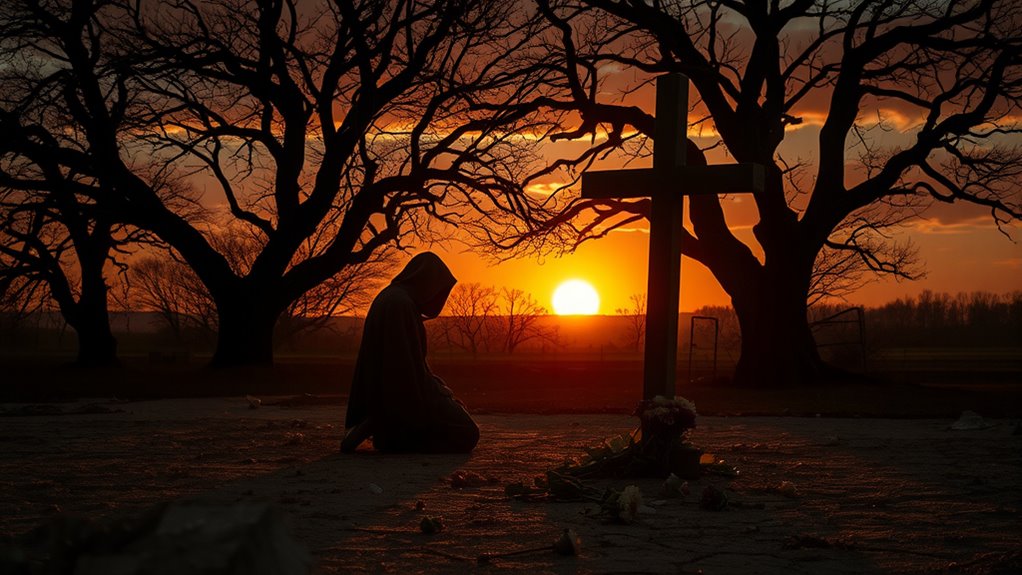The Bible explains that evil entered the world through Satan’s rebellion and the exercise of free will. God’s sovereignty works with human choices to bring about a redemptive plan, offering hope amid suffering. Though sin causes chaos and pain, God’s love and justice are ultimately at work. If you want to understand how hope and divine purpose shine through darkness, exploring this further will reveal more about God’s plan for overcoming evil.
Key Takeaways
- Evil originated with Satan’s rebellion, introducing sin into a perfect creation, illustrating free will’s role in moral choice.
- God’s sovereignty and human free will work together, allowing genuine choice while maintaining divine control.
- Sin causes suffering and chaos, reflecting a fallen world impacted by moral disobedience and brokenness.
- God’s redemptive plan through Christ offers forgiveness, transforming hearts and ultimately defeating evil.
- Scripture affirms God’s justice and promises hope, reassuring believers that evil will be ultimately judged and redeemed.
The Biblical Narrative of Evil’s Origin

In the Biblical narrative, evil originates with the rebellion of Satan, also known as Lucifer, who was created as a perfect angel but chose to oppose God. This act marks the origins of evil through the angelic rebellion, where Lucifer sought to exalt himself above the Creator. Once he defied God’s authority, a cosmic conflict ensued, leading to Satan and his followers being cast out of heaven. This rebellion introduced sin and disobedience into the spiritual domain, setting the stage for evil’s presence in the world. The biblical account emphasizes that evil’s roots are tied to free will, highlighting how a perfect being’s choice to rebel caused a profound disruption. Understanding this origin helps explain how evil entered a previously perfect creation.
God’s Sovereignty and Human Free Will

God’s sovereignty and human free will are often seen as two fundamental principles that can seem to conflict but actually work together in the biblical understanding. Divine sovereignty emphasizes God’s supreme power and control over all creation, while human free will highlights our capacity to make genuine choices. Recognizing their harmony helps resolve the apparent dilemma of evil’s existence. Consider these points:
God’s sovereignty and human free will work together, shaping history and individual choices within God’s divine plan.
- God’s sovereignty establishes the ultimate purpose and plan.
- Human free will allows us to choose obedience or rebellion.
- God’s control doesn’t negate our personal responsibility.
- Both work together in God’s divine plan, allowing genuine freedom within His sovereignty.
This balance reveals that God’s sovereignty guides history, yet human free will shapes individual lives, maintaining a meaningful relationship between divine control and personal choice.
The Role of Sin and Its Consequences

Have you ever wondered how sin influences human life and the world around us? Sin affects more than just individual choices; it impacts the entire creation. When humans neglect their moral responsibility, consequences follow, often in the form of natural disasters like floods, earthquakes, or storms. These events aren’t always direct retributions from God but can result from a fallen world marred by sin. Our moral responsibility includes recognizing how our actions contribute to these consequences. Sin distorts the harmony God intended, leading to suffering and chaos. Understanding this connection helps us see that evil isn’t solely divine punishment but also a result of human choices and a broken creation. Recognizing sin’s role encourages accountability and a desire for redemption.
God’s Redemptive Plan in the Midst of Evil

How does divine love shine through the darkness of evil? It reveals God’s redemptive plan, even amid moral ambiguity. You see, God’s justice isn’t blind; it balances divine mercy and righteousness. His plan unfolds through:
- Sending Christ to bridge humanity’s brokenness and restore justice.
- Offering forgiveness that transforms hearts despite evil’s presence.
- Using suffering to refine faith and demonstrate divine purpose.
- Ensuring eventual victory over evil, affirming God’s sovereignty.
This plan shows that evil isn’t the end but a part of a greater divine purpose. God’s love persists, working through moral ambiguity to bring salvation and uphold divine justice, demonstrating that even in darkness, His redemptive power shines brightly.
Finding Hope and Assurance in Scripture

Amid the darkness of evil, scripture offers a wellspring of hope and reassurance that sustains faith. When doubts arise, God’s promises remind you that your faith has assurance rooted in His unwavering truth. Scriptures like Romans 8:28 affirm that even in suffering, God works for good, providing comfort amid chaos. You can trust in divine justice, knowing that evil will not go unpunished and that God’s perfect timing will bring justice. These promises strengthen your confidence that God’s plan is ultimately good, even when circumstances seem bleak. By meditating on God’s word, you find hope that transcends pain and uncertainty, anchoring your soul in His divine sovereignty and love. Your faith grows as you cling to these divine assurances.
Frequently Asked Questions
How Does the Problem of Evil Differ Among Various Christian Denominations?
You’ll find that denominational perspectives shape how different Christian groups view evil’s existence. Some emphasize free will, seeing evil as a consequence of human choices, while others focus on divine sovereignty, accepting evil as part of God’s plan. Doctrinal differences influence these views, leading to varied explanations of suffering and evil’s purpose. These perspectives reflect each denomination’s unique beliefs about God’s nature, human responsibility, and the ultimate hope for redemption.
Can Evil Exist Without God’s Permission or Knowledge?
Have you ever wondered if evil can exist without God’s knowledge or permission? From a biblical perspective, it can’t. Free will allows humans to choose good or evil, but divine sovereignty means God permits this for a greater purpose. While evil exists, God’s permission doesn’t negate His sovereignty. Instead, it shows that He allows free will, trusting that ultimately, His divine plan prevails over evil.
How Do Non-Biblical Religions Address the Problem of Evil?
You’ll find that non-biblical religions address evil through ideas like moral dualism and karma justice. In Zoroastrianism, good and evil are in constant conflict, highlighting moral dualism. Hinduism and Buddhism believe karma justice balances actions and consequences, explaining evil as a result of past deeds. These views suggest evil exists as part of a cosmic struggle or moral law, rather than being directly permitted by a divine being.
What Are Some Modern Philosophical Responses to the Problem of Evil?
When exploring modern philosophical responses to the problem of evil, you see ideas like free will and soul-making theodicies. They suggest that evil exists because free will allows humans to choose wrong, and suffering can help develop moral and spiritual growth. You might find these perspectives appealing because they offer a way to reconcile the existence of evil with a benevolent, omnipotent deity, emphasizing human development and moral responsibility.
How Do Personal Experiences of Suffering Influence Faith and Beliefs?
When you face personal suffering, it can shake your faith and challenge your beliefs. But these experiences often deepen your faith resilience, showing you that struggles can lead to growth and trust in divine purpose. You might feel overwhelmed or abandoned, yet your suffering can also become a powerful reminder of hope and perseverance. Embracing these moments helps you develop a stronger, more genuine connection to your faith journey.
Conclusion
As you reflect on the biblical story of evil, remember that over 60% of people worldwide report experiencing suffering or hardship. Yet, God’s sovereignty and redemptive plan offer hope amid darkness. You can find assurance in Scripture that evil isn’t the final word—God’s love and power work through pain to bring about ultimate good. Trust in His promises, knowing that His plan includes your healing and restoration, even in the face of suffering.










